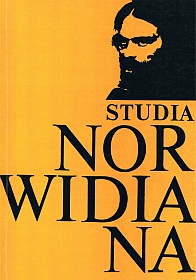Norwid, an European
Abstract
This article considers the reception of Norwid’s poetry in the Anglo-Saxon context. Understanding foreign poetry depends mainly on the chosen strategy of translation. Frequently, it opens wide vistas in the landscape of the native tradition but, on the other hand, the sheer unadaptability of many themes and motives suggests sometimes a more modest procedure which tries to salvage the originality of a poem, even if this means diminishing its artistic impact. Is it possible to establish comparative contexts on which the Anglo-Saxon reader can draw in order to get access to the complicated phenomenon of Norwid’s poetry?
Until now his place in the European literary tradition has been determined by its supposed closeness to West-European symbolist and modernist poetry. These contexts often turned out to be blatantly anachronistic. But, if we agree to make allowance for this kind of comparative readings, should it not be possible for us, witnesses of the decline of ideology and the rising tide of Postmodernism, to discover more „relevant” backgrounds? It seems that the peculiar mood of our times has been taken into account by Adam Czerniawski, whose translations of Norwid’s poetry are among the best until now.
It has been the fashion to show Norwid as a poet far in advance of his age. He has been hailed as the father of modern Polish poetry. Such a statement entails that his role can only be appreciated in relation to his ,,Po1ishness” and the identity of Polish poetry. On the other hand, his nationality arouses in the Anglo-Saxon reader certain geographical and historical notions. Norwid’s writings become part of the wider context of East (or Central) European postwar literature (which is readily accessible in translation). They will be assessed in relation to such well-known themes as the tension between individual liberty and deterministic conceptions of history and anthropology, the poet’s plight in the totalitarian state and the identity of the émigré, who attempts to come to terms with his past in the conditions of the „Open Society”. Especially this last theme seems to be of great urgency for the Anglo-Saxon (and in general „Western”) reader. In the „Open Society”, which could also be called „The World of Commerce and Industry” (Zofia Stefanowska), matters are too complicated for clear-cut distinctions between black or white, right or wrong. How then can one preserve an overall view in the equivocal and shimmering reality of this world? An answer to this challenge is offered by the peculiar way of perceiving reality that has been the natural (but not altogether pleasant) privilege of the contemporary émigré from Eastern-Europe, who in spite of his attempts to do justice to the reality of the „World of Commerce and Industry” never forgets his in an elusive way more „authentic” and fundamental experiences in the „Realm of Oppression and Coercion”. This equivocal state of mind gives rise to a poetry in which irony and pathos coexist in a difficult but very convincing marriage. The pilgrim and moralist (in Norwid’s poetry) can be seen as precursors of the modern East-European émigré who, if he is a writer, will try to exploit this dichotomy in order to breathe new life into a literary tradition which seems to have lost its emotional drive and moral urgency. Such an interpretation of the state of Western poetry is well in tune with reader expectations. Norwid’s poetry will be incorporated (as has been shown by Stanisław Barańczak) into the main-stream of East-European (and especially Polish - Miłosz, Herbert, Szymborska) poetry with its discourse of irony, moral commitment and civic religiousness.
Copyright (c) 1993 Studia Norwidiana

This work is licensed under a Creative Commons Attribution-NonCommercial-NoDerivatives 4.0 International License.





